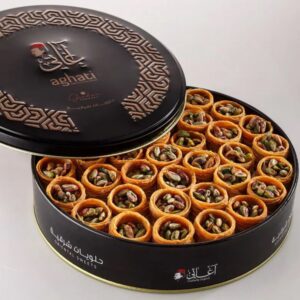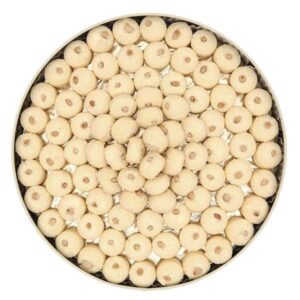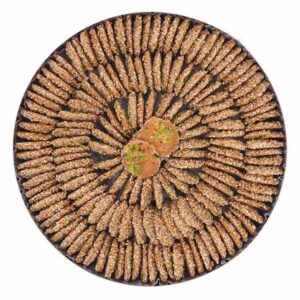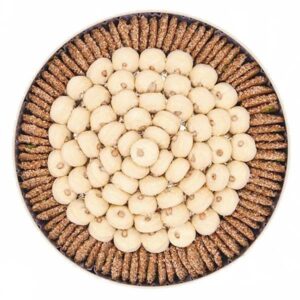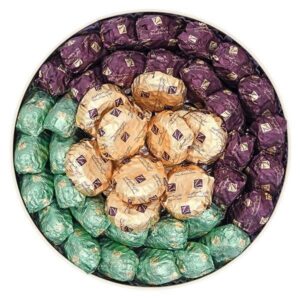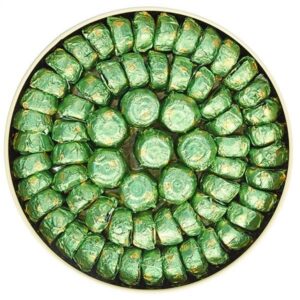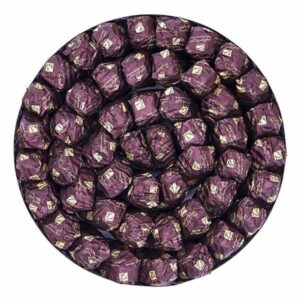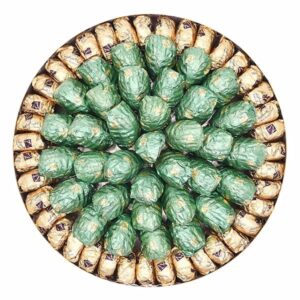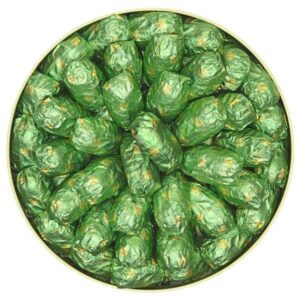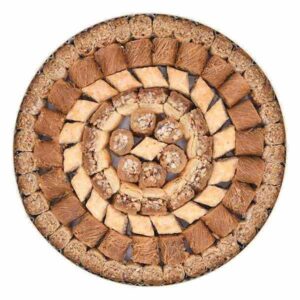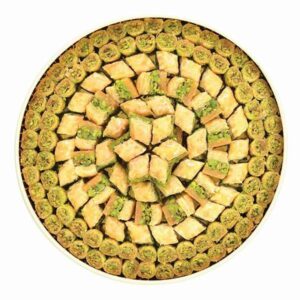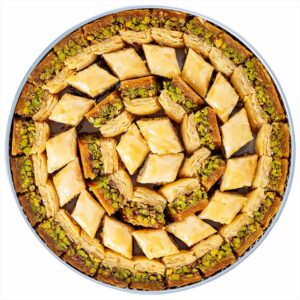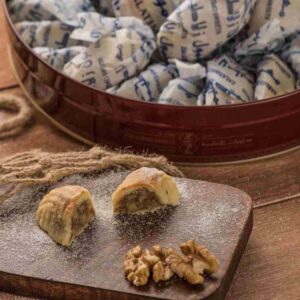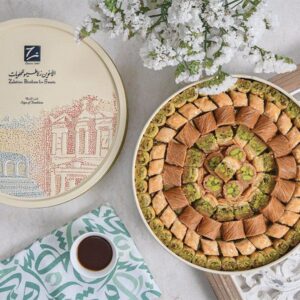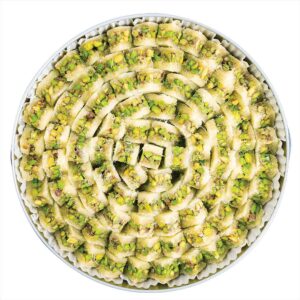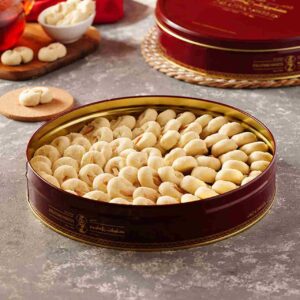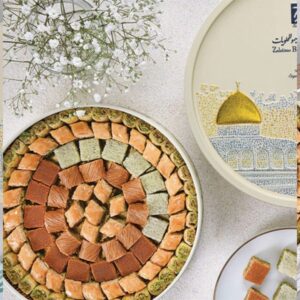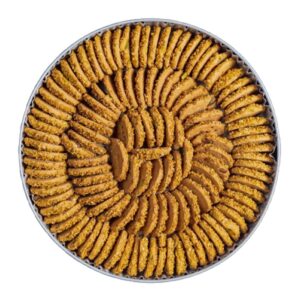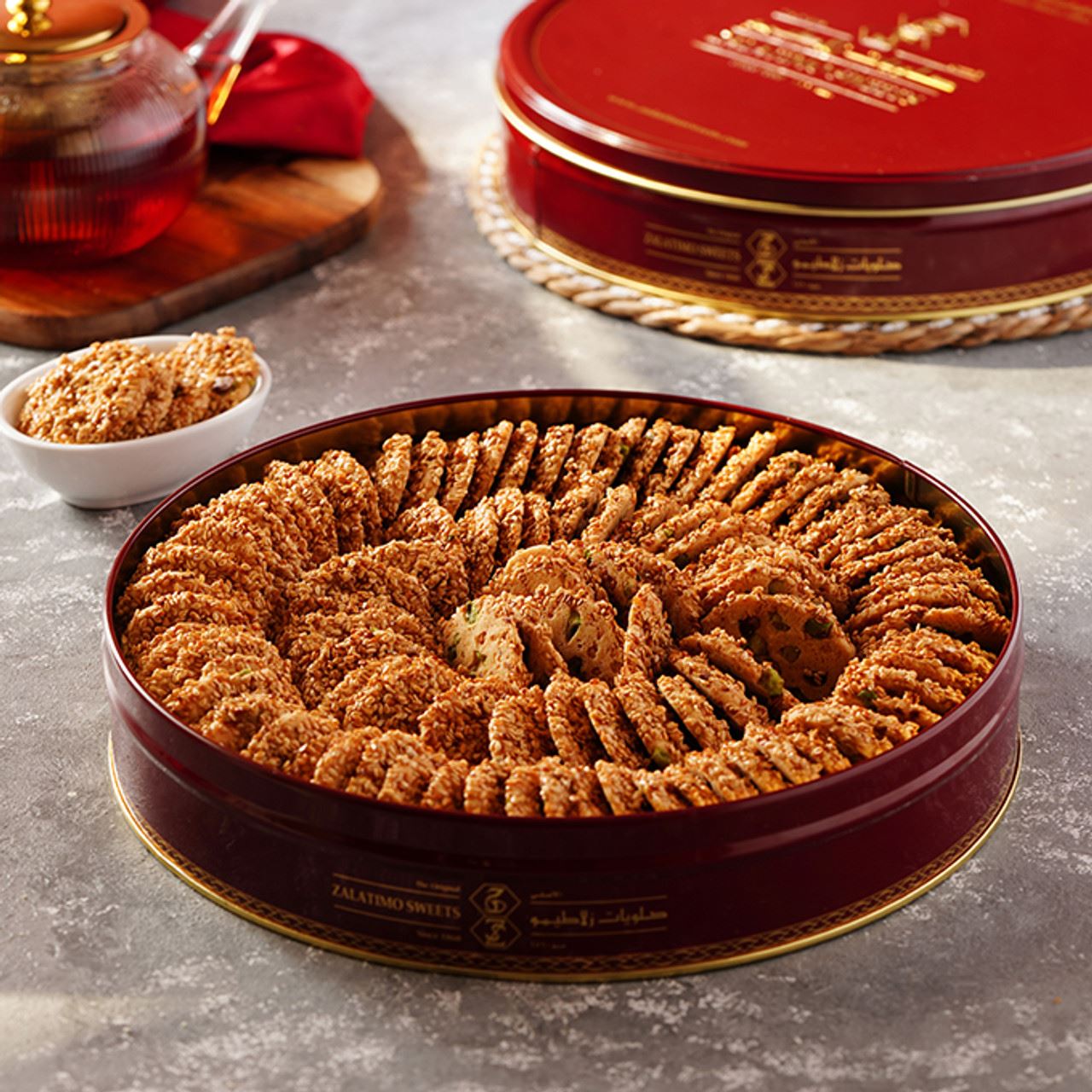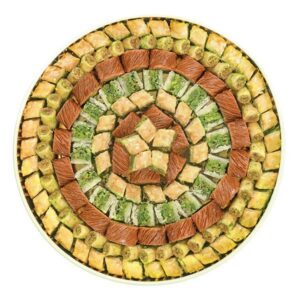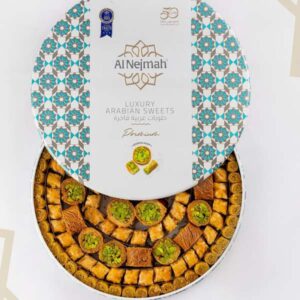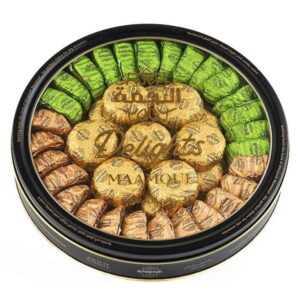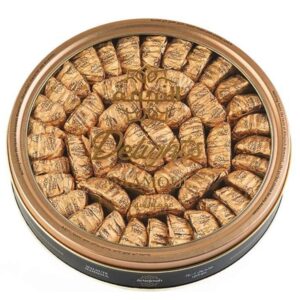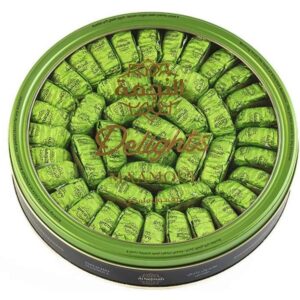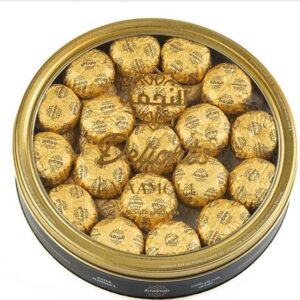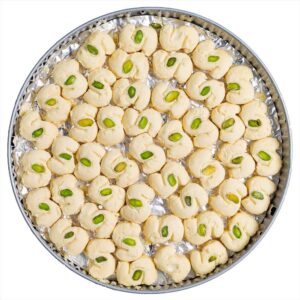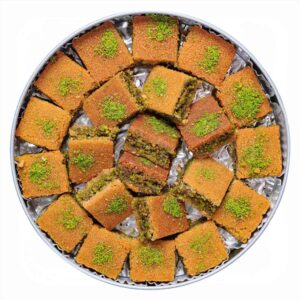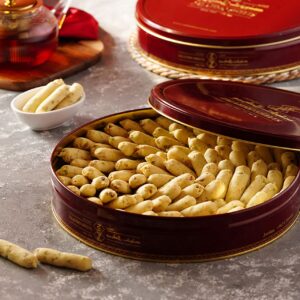Introducing Baklavati Sweets
Where the rich flavors of authentic Turkish baklava meet the finest Eastern and Arabic confections. Our exquisite sweets are meticulously handcrafted with high-quality ingredients, ensuring that each bite delivers a delightful experience that honors traditional recipes while embracing exceptional taste.
Experience the allure of Baklavati Sweets and elevate your dessert repertoire. Treat yourself or share these delightful confections with loved ones to create lasting memories. Visit our website to explore our full range of offerings and place your order today. Discover the taste of tradition with every delectable bite!
Product Carousel Tabs
Oush El Bulbul Pistachio | Aghati Sweets
Treat yourself to a taste of the Mediterranean with Aghati Sweets’ Oush El Bulbul Pistachio. These flaky, honey-drenched pastries are the perfect indulgence for any occasion. Layers of buttery phyllo dough are filled with a decadent blend of chopped nuts, creating a symphony of flavors in every bite. Whether you’re craving a classic walnut baklava or want to try something new like pistachio or almond, this assortment has got you covered. Grab a box and let the flavors of the East transport you to a world of sweetness. Aghati Sweets – bringing a little bit of the Mediterranean to your everyday.
Assorted Baklava with Pistachio & Cashew | Aghati Sweets
Treat yourself to a taste of the Mediterranean with Aghati Sweets’ Assorted Baklava. These flaky, honey-drenched pastries are the perfect indulgence for any occasion. Layers of buttery phyllo dough are filled with a decadent blend of chopped nuts, creating a symphony of flavors in every bite. Whether you’re craving a classic walnut baklava or want to try something new like pistachio or almond, this assortment has got you covered. Grab a box and let the flavors of the East transport you to a world of sweetness. Aghati Sweets – bringing a little bit of the Mediterranean to your everyday.
Baklava Assortment | Bagajati Sweets
Indulge in the irresistible flavors of Bagajati Sweets’ Baklava Assortment. Crafted with layers of flaky phyllo dough, sweet honey, and a medley of chopped nuts, each bite of our baklava is a symphony of textures and tastes. Passed down through generations, our family’s secret recipe ensures the perfect balance of richness and sweetness in every piece. Whether you’re treating yourself or gifting to loved ones, this assortment of traditional and unique baklava flavors will leave you craving more. Experience the authentic taste of Bagajati Sweets’ Baklava Assortment and savor the essence of Mediterranean culinary excellence. Order yours today and indulge in a truly delectable delight.
Assortment Baklava with Burma Shamieh | Bagajati Sweets
Indulge in the irresistible flavors of the East with Bagajati Sweets’ Assortment Baklava with Burma Shamieh. Meticulously crafted using time-honored recipes, this exquisite selection of baklava and shamieh will transport your taste buds on a journey of pure delight. Layers of flaky phyllo dough are lovingly wrapped around a luscious filling of chopped nuts, infused with the perfect balance of aromatic spices and sweet syrup. The Burma shamieh, a traditional Middle Eastern delicacy, adds an extra dimension of richness and complexity to this irresistible assortment. Indulge in the perfect harmony of crunch, chewiness, and melt-in-your-mouth goodness with every bite.
Assortment Premium Baklava | Bagajati Sweets
Indulge in the irresistible flavors of Bagajati Sweets’ Assortment Baklava. Crafted with meticulous attention to detail, each delicate layer of flaky phyllo dough is infused with the perfect balance of sweet, nutty goodness. Savor the rich, buttery taste and the satisfying crunch that will transport your taste buds to the heart of the Mediterranean. Whether you’re treating yourself or impressing guests, this assortment of traditional baklava is sure to delight. Experience the authentic, time-honored craftsmanship of Bagajati Sweets and elevate your dessert experience today. Discover the irresistible allure of Assortment Baklava.
Shamiyeh Burma | Aghati Sweets
Indulge in the authentic flavors of Burma with Shamiyeh’s Aghati Sweets. These delectable treats are handcrafted using time-honored recipes and the finest, all-natural ingredients. Sink your teeth into the delicate, melt-in-your-mouth texture and savor the perfect balance of sweetness and aromatic spices. Whether you’re looking for a midday pick-me-up or a special dessert to share with loved ones, Shamiyeh’s Aghati Sweets are the perfect choice. Treat yourself to a taste of Burma’s rich culinary heritage – order your box today!
Ozel Assorted Baklava with Pistachio | Aghati Sweets
Treat yourself to a taste of the Mediterranean with Aghati Sweets’ Assorted Baklava. These flaky, honey-drenched pastries are the perfect indulgence for any occasion. Layers of buttery phyllo dough are filled with a decadent blend of chopped nuts, creating a symphony of flavors in every bite. Whether you’re craving a classic walnut baklava or want to try something new like pistachio or almond, this assortment has got you covered. Grab a box and let the flavors of the East transport you to a world of sweetness. Aghati Sweets – bringing a little bit of the Mediterranean to your everyday.
Sugar-Free Mixed Maamoul | Zalatimo Brothers
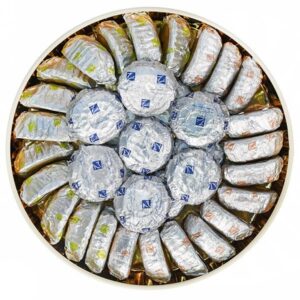
Sugar-Free Mixed Maamoul | Zalatimo Brothers
Satisfy your sweet tooth the guilt-free way with Zalatimo Brothers Sweets’ sugar-free Mixed Maamoul. Packed with the irresistible flavors of pistachios, walnuts, and dates, these bite-sized treats are the perfect pick-me-up or after-dinner indulgence. And the best part? Each Maamoul is individually wrapped, so you can enjoy them on the go without any mess. Ditch the unhealthy snacks and treat yourself to the rich, satisfying taste of Zalatimo Brothers Sweets. Your taste buds (and waistline) will thank you.
Mixed Maamoul | Zalatimo Brothers
Indulge in the authentic flavors of the Middle East with Zalatimo Brothers Sweets’ Mixed Maamoul. These bite-sized pastries come in a delightful assortment of pistachio, walnut, and date fillings, all wrapped up individually for your convenience. Sink your teeth into the buttery, crumbly exterior and savor the rich, nutty goodness within. Whether you’re looking for a quick snack or a sweet treat to share, Zalatimo Brothers Maamoul are the perfect companion. Grab a box and let your taste buds travel to the heart of the Mediterranean without leaving home.
Mini Maamoul Pistachios | Zalatimo Brothers
Treat yourself to the irresistible taste of Zalatimo Brothers Sweets’ Maamoul Pistachios Mini. These bite-sized pastries are filled with the rich, creamy goodness of premium pistachios and wrapped individually for ultimate convenience. Whether you’re craving a sweet snack or looking to share a little something special, the Maamoul Pistachios Mini are the perfect choice. With their buttery, crumbly texture and the perfect balance of flavors, these mini maamoul are sure to become your new go-to indulgence. Grab a pack today and savor the authentic, homemade taste of Zalatimo Brothers Sweets.
Maamoul Walnuts | Zalatimo Brothers
Indulge in the authentic flavors of the Middle East with Zalatimo Brothers Sweets. Our Maamoul Walnuts are the perfect bite-sized treat, made with the finest ingredients and individually wrapped for your convenience. Sink your teeth into the buttery, crumbly pastry shell and savor the rich, nutty filling – it’s a taste of tradition that will transport you to the bustling streets of the Levant. Whether you’re craving a midday pick-me-up or a sweet after-dinner delight, Zalatimo Brothers Sweets have got you covered. Grab a pack and let the flavors of the Middle East brighten your day.
Mini Maamoul Pistachios and Dates | Zalatimo Brothers
Treat yourself to a taste of the Middle East with Zalatimo Brothers Sweets’ Mini Maamoul! These bite-sized pastries are filled with the irresistible flavors of pistachios and dates, creating a delightful balance of sweet and nutty. Perfect for satisfying your sweet tooth or sharing with friends, the Mini Maamoul are made with care by the Zalatimo family, whose confectionery legacy spans generations. Indulge in the rich, buttery goodness of these traditional Middle Eastern delights – your taste buds will thank you!
Maamoul Pistachios | Zalatimo Brothers
Treat yourself to a taste of the Middle East with Zalatimo Brothers Sweets’ delectable Maamoul Pistachios. These bite-sized pastries are filled with a rich, creamy pistachio center and dusted with a light coating of powdered sugar. Perfectly balanced between sweet and nutty, each melt-in-your-mouth morsel will transport your senses to the bustling streets of the Levant. Whether you’re craving a midday pick-me-up or a casual after-dinner delight, Zalatimo Brothers Sweets’ Maamoul Pistachios are the way to go. Grab a box and indulge in a little slice of Middle Eastern heaven.
Pine With Mixed Nuts Baklava | Zalatimo Brothers
Indulge in the authentic flavors of the Middle East with Zalatimo Brothers Sweets. Our Pine With Mixed Nuts Baklawa and Burma & Pine With Mixed Nuts Rolls are handcrafted masterpieces that will transport your taste buds to the heart of the Levant. Meticulously layered with flaky phyllo dough and bursting with the rich, nutty goodness of pine nuts and a medley of premium nuts, these decadent treats are a true delight. Treat yourself or share with loved ones – either way, you’ll savor every bite of this time-honored culinary tradition. Elevate your dessert experience with the unparalleled quality of Zalatimo Brothers Sweets.
Lite Baklava | Zalatimo Brothers
Indulge in the irresistible taste of Zalatimo Brothers Sweets’ Lite Baklava. Crafted with precision, our baklava features delicate layers of flaky phyllo dough, crunchy nuts, and a drizzle of our signature all-natural fruit sugar syrup. Unlike traditional baklava, our version is lighter and less sugary, allowing the true flavors of the ingredients to shine. Treat yourself to a guilt-free moment of indulgence with Zalatimo Brothers Sweets. Experience the perfect balance of sweetness and crunch in every bite. Get your box of Lite Baklava today and savor the difference quality ingredients and craftsmanship.
Assortment Premium Baklava | Bagajati Sweets
Indulge in the irresistible flavors of Bagajati Sweets’ Assortment Baklava. Crafted with meticulous attention to detail, each delicate layer of flaky phyllo dough is infused with the perfect balance of sweet, nutty goodness. Savor the rich, buttery taste and the satisfying crunch that will transport your taste buds to the heart of the Mediterranean. Whether you’re treating yourself or impressing guests, this assortment of traditional baklava is sure to delight. Experience the authentic, time-honored craftsmanship of Bagajati Sweets and elevate your dessert experience today. Discover the irresistible allure of Assortment Baklava.
Pistachio Maamoul | Bagajati Sweets
Indulge in the irresistible flavors of Bagajati Sweets’ Pistachio Maamoul. These authentic Middle Eastern delicacies are crafted with the finest ingredients, delivering a perfect balance of buttery pastry and rich, nutty filling. Bursting with the aromatic essence of freshly ground pistachios, each bite will transport you to the heart of a bustling Middle Eastern marketplace. Savor the exquisite texture and captivating flavors that make Bagajati Sweets’ Pistachio Maamoul a true culinary masterpiece. Treat yourself or delight your guests with this irresistible confection. Experience the unparalleled taste of tradition – order your Pistachio Maamoul from Bagajati Sweets today.
Sugar-Free Mixed Maamoul | Zalatimo Brothers

Sugar-Free Mixed Maamoul | Zalatimo Brothers
Satisfy your sweet tooth the guilt-free way with Zalatimo Brothers Sweets’ sugar-free Mixed Maamoul. Packed with the irresistible flavors of pistachios, walnuts, and dates, these bite-sized treats are the perfect pick-me-up or after-dinner indulgence. And the best part? Each Maamoul is individually wrapped, so you can enjoy them on the go without any mess. Ditch the unhealthy snacks and treat yourself to the rich, satisfying taste of Zalatimo Brothers Sweets. Your taste buds (and waistline) will thank you.
Walnut Maamoul | Bagajati Sweets
Indulge in the irresistible flavors of Bagajati Sweets’ Walnut Maamoul. These traditional Middle Eastern shortbread cookies are meticulously crafted with the finest walnuts, perfectly balanced with a delicate sweetness. Bite into the buttery, crumbly exterior and savor the rich, nutty filling that melts in your mouth. Bagajati Sweets’ Walnut Maamoul is a true delight for the senses, transporting you to the heart of the Middle East with every taste. Elevate your snacking experience and treat yourself to the unparalleled quality of these artisanal sweets. Discover the difference that authentic ingredients and time-honored techniques can make. Indulge in the Bagajati Sweets Walnut Maamoul experience today.
Habibah Sweets | Baklava
Indulge in the irresistible flavors of Habibah Sweets’ authentic baklava. Meticulously crafted with layers of flaky phyllo dough, crunchy nuts, and decadent syrup, our baklava is a true taste of Middle Eastern tradition. Bursting with the perfect balance of sweetness and crunch, each bite will transport you to the bustling markets of the Levant. Treat yourself or delight your guests with the unparalleled quality and authenticity of Habibah Sweets’ baklava. Experience the difference that comes from generations of perfecting this beloved pastry. Order now and savor the essence of Middle Eastern culinary excellence.
Lite Baklava | Zalatimo Brothers
Indulge in the irresistible taste of Zalatimo Brothers Sweets’ Lite Baklava. Crafted with precision, our baklava features delicate layers of flaky phyllo dough, crunchy nuts, and a drizzle of our signature all-natural fruit sugar syrup. Unlike traditional baklava, our version is lighter and less sugary, allowing the true flavors of the ingredients to shine. Treat yourself to a guilt-free moment of indulgence with Zalatimo Brothers Sweets. Experience the perfect balance of sweetness and crunch in every bite. Get your box of Lite Baklava today and savor the difference quality ingredients and craftsmanship.
Zalatimo Sweets | Maamoul Walnuts
Indulge in the irresistible flavors of Zalatimo Sweets’ walnut maamoul. These delectable pastries are meticulously handcrafted using only the finest, all-natural ingredients, including freshly ground walnuts and a delicate dough that melts in your mouth. Individually wrapped for ultimate convenience, Zalatimo’s walnut maamoul are the perfect treat to enjoy anytime, anywhere. Savor the rich, buttery goodness and let the flavors transport you to the heart of the Middle East. Treat yourself or delight your loved ones with the unparalleled quality and taste of Zalatimo Sweets’ walnut maamoul. Indulge in the authentic flavors that have been perfected over generations – order yours today.
Ozel Assorted Baklava with Pistachio | Aghati Sweets
Treat yourself to a taste of the Mediterranean with Aghati Sweets’ Assorted Baklava. These flaky, honey-drenched pastries are the perfect indulgence for any occasion. Layers of buttery phyllo dough are filled with a decadent blend of chopped nuts, creating a symphony of flavors in every bite. Whether you’re craving a classic walnut baklava or want to try something new like pistachio or almond, this assortment has got you covered. Grab a box and let the flavors of the East transport you to a world of sweetness. Aghati Sweets – bringing a little bit of the Mediterranean to your everyday.
Classic Baklava Assortment | Zalatimo Brothers
Indulge in the timeless flavors of the Middle East with the Classic Baklava Assortment from Zalatimo Brothers. Crafted with generations of expertise, these delicate pastries feature layer upon layer of flaky phyllo dough, crunchy nuts, and a drizzle of sweet, fragrant syrup. Each bite transports you to the bustling souks of the Levant, where the aroma of freshly baked baklava fills the air. Treat yourself or delight your guests with this authentic, irresistible assortment. Savor the rich, buttery goodness and let the flavors of tradition melt in your mouth. Experience the true taste of the Middle East with Zalatimo Brothers’ Classic Baklava Assortment – a timeless indulgence you won’t soon forget.
Habibah Sweets | Baloreyeh
Experience something truly exceptional with our Habibah Pistachio Baloriyah. This delectable confection combines the rich, buttery flavor of pistachio with a subtle hint of aromatic orange blossom water, creating a taste sensation that will captivate your senses. Indulge in the perfect balance of sweet and savory, as the creamy pistachio filling melts in your mouth, leaving you craving more. Crafted with the finest ingredients and time-honored techniques, our Habibah Pistachio Baloriyah is a testament to the art of confectionery. Elevate your dessert experience and treat yourself to the unparalleled taste of Habibah Sweets. Order yours now and discover the extraordinary.
Pine With Mixed Nuts Baklava | Zalatimo Brothers
Indulge in the authentic flavors of the Middle East with Zalatimo Brothers Sweets. Our Pine With Mixed Nuts Baklawa and Burma & Pine With Mixed Nuts Rolls are handcrafted masterpieces that will transport your taste buds to the heart of the Levant. Meticulously layered with flaky phyllo dough and bursting with the rich, nutty goodness of pine nuts and a medley of premium nuts, these decadent treats are a true delight. Treat yourself or share with loved ones – either way, you’ll savor every bite of this time-honored culinary tradition. Elevate your dessert experience with the unparalleled quality of Zalatimo Brothers Sweets.
Zalatimo Sweets | Mini Assorted Maamoul
Indulge in a symphony of flavors with Zalatiom’s Sweets Assorted Maamoul, meticulously crafted to satisfy your cravings for dates, pistachios, and walnuts. These delectable pastries are a celebration of Middle Eastern tradition and craftsmanship, offering a trio of irresistible fillings.
Habibah Sweets | Walnut Maamoul
Indulge in the exquisite flavors of the East with Habibah Sweets’ Walnut Semolina Maamoul Can. This unique dessert boasts a delectable walnut filling encased in a perfectly formed semolina shell. Meticulously crafted with care, each Maamoul can is a work of art, featuring lovely shapes that elevate any special occasion. Prepare to be captivated by the unparalleled taste and aroma that will transport your senses to the heart of the Middle East. Treat yourself or your guests to the exceptional quality of Habibah Sweets’ Walnut Semolina Maamoul Can – a dessert that demands to be savored and shared.
Shamiyeh Burma | Aghati Sweets
Indulge in the authentic flavors of Burma with Shamiyeh’s Aghati Sweets. These delectable treats are handcrafted using time-honored recipes and the finest, all-natural ingredients. Sink your teeth into the delicate, melt-in-your-mouth texture and savor the perfect balance of sweetness and aromatic spices. Whether you’re looking for a midday pick-me-up or a special dessert to share with loved ones, Shamiyeh’s Aghati Sweets are the perfect choice. Treat yourself to a taste of Burma’s rich culinary heritage – order your box today!
Baklava Assortment | Zalatimo Brothers
Indulge in the authentic flavors of the Middle East with the Baklava Assortment from Zalatimo Brothers. Crafted using time-honored recipes and the finest ingredients, these delectable pastries will transport your taste buds on a journey of pure delight. Layers of flaky phyllo dough are meticulously hand-rolled and filled with a harmonious blend of chopped nuts, fragrant spices, and sweet syrup. Each bite offers a symphony of textures and flavors that will leave you craving more. Treat yourself or share this exquisite Baklava Assortment with loved ones – it’s a true taste of tradition that will elevate any occasion. Experience the unparalleled quality and craftsmanship of Zalatimo Brothers today.
Habibah Sweets | Pistachio Burma
Indulge in the exquisite taste of Habibah Sweets’ Pistachio Burma. This traditional Eastern delicacy is meticulously crafted by our skilled chefs using only the finest, freshest ingredients. Prepare to be captivated by its soft, velvety texture and the unparalleled richness of its flavor. Pistachio Burma is not just a sweet treat – it’s a culinary masterpiece that will transport your senses to the heart of the East. Elevate your dessert experience and savor the perfection that is Habibah Sweets. Treat yourself or delight your loved ones with this irresistible confection. Get your Pistachio Burma today and discover the true meaning of indulgence.
Maamoul Pistachios | Zalatimo Brothers
Treat yourself to a taste of the Middle East with Zalatimo Brothers Sweets’ delectable Maamoul Pistachios. These bite-sized pastries are filled with a rich, creamy pistachio center and dusted with a light coating of powdered sugar. Perfectly balanced between sweet and nutty, each melt-in-your-mouth morsel will transport your senses to the bustling streets of the Levant. Whether you’re craving a midday pick-me-up or a casual after-dinner delight, Zalatimo Brothers Sweets’ Maamoul Pistachios are the way to go. Grab a box and indulge in a little slice of Middle Eastern heaven.
Zalatimo Sweets | Diamond Assortment
Elevate your dessert experience with the Diamond Assortment from Zalatimo Sweets. Indulge in the perfect harmony of tradition, quality, and unparalleled taste. Order your box today and discover the true essence of Middle Eastern confectionery excellence.
Flour Dates Kaek | Habibah Sweets
Indulge in the authentic taste of the Middle East with Habibah Sweets’ Flour Dates Kaek. These decadent pastries are crafted with the finest ingredients, delivering a harmonious blend of chewy dates and buttery, flaky dough. Savor the rich, caramelized flavors in every bite, and experience the time-honored tradition of Middle Eastern confectionery. Habibah Sweets’ Flour Dates Kaek are a must-have for any discerning dessert lover. Elevate your snacking experience and treat yourself to the unparalleled sweetness of this iconic delicacy. Get your box of Habibah Sweets Flour Dates Kaek today and indulge in a taste of the exotic.
Bestseller Sweets
-
Baklava, Baklava Assortment
Oush El Bulbul Pistachio | Aghati Sweets
Treat yourself to a taste of the Mediterranean with Aghati Sweets’ Oush El Bulbul Pistachio. These flaky, honey-drenched pastries are the perfect indulgence for any occasion. Layers of buttery phyllo dough are filled with a decadent blend of chopped nuts, creating a symphony of flavors in every bite. Whether you’re craving a classic walnut baklava or want to try something new like pistachio or almond, this assortment has got you covered. Grab a box and let the flavors of the East transport you to a world of sweetness. Aghati Sweets – bringing a little bit of the Mediterranean to your everyday.
SKU: n/a -
Baklava, Baklava Assortment
Assorted Baklava with Pistachio & Cashew | Aghati Sweets
Treat yourself to a taste of the Mediterranean with Aghati Sweets’ Assorted Baklava. These flaky, honey-drenched pastries are the perfect indulgence for any occasion. Layers of buttery phyllo dough are filled with a decadent blend of chopped nuts, creating a symphony of flavors in every bite. Whether you’re craving a classic walnut baklava or want to try something new like pistachio or almond, this assortment has got you covered. Grab a box and let the flavors of the East transport you to a world of sweetness. Aghati Sweets – bringing a little bit of the Mediterranean to your everyday.
SKU: n/a -
Baklava, Baklava Assortment
Ozel Assorted Baklava with Pistachio | Aghati Sweets
Treat yourself to a taste of the Mediterranean with Aghati Sweets’ Assorted Baklava. These flaky, honey-drenched pastries are the perfect indulgence for any occasion. Layers of buttery phyllo dough are filled with a decadent blend of chopped nuts, creating a symphony of flavors in every bite. Whether you’re craving a classic walnut baklava or want to try something new like pistachio or almond, this assortment has got you covered. Grab a box and let the flavors of the East transport you to a world of sweetness. Aghati Sweets – bringing a little bit of the Mediterranean to your everyday.
SKU: n/a -
Dates Maamoul, Maamoul, Pistachio Maamoul, Walnut Maamoul
Sugar-Free Mixed Maamoul | Zalatimo Brothers
 Dates Maamoul, Maamoul, Pistachio Maamoul, Walnut Maamoul
Dates Maamoul, Maamoul, Pistachio Maamoul, Walnut MaamoulSugar-Free Mixed Maamoul | Zalatimo Brothers
Satisfy your sweet tooth the guilt-free way with Zalatimo Brothers Sweets’ sugar-free Mixed Maamoul. Packed with the irresistible flavors of pistachios, walnuts, and dates, these bite-sized treats are the perfect pick-me-up or after-dinner indulgence. And the best part? Each Maamoul is individually wrapped, so you can enjoy them on the go without any mess. Ditch the unhealthy snacks and treat yourself to the rich, satisfying taste of Zalatimo Brothers Sweets. Your taste buds (and waistline) will thank you.
SKU: n/a -
Dates Maamoul, Maamoul, Pistachio Maamoul, Walnut Maamoul
Mixed Maamoul | Zalatimo Brothers
Indulge in the authentic flavors of the Middle East with Zalatimo Brothers Sweets’ Mixed Maamoul. These bite-sized pastries come in a delightful assortment of pistachio, walnut, and date fillings, all wrapped up individually for your convenience. Sink your teeth into the buttery, crumbly exterior and savor the rich, nutty goodness within. Whether you’re looking for a quick snack or a sweet treat to share, Zalatimo Brothers Maamoul are the perfect companion. Grab a box and let your taste buds travel to the heart of the Mediterranean without leaving home.
SKU: n/a -
Maamoul, Pistachio Maamoul
Mini Maamoul Pistachios | Zalatimo Brothers
Treat yourself to the irresistible taste of Zalatimo Brothers Sweets’ Maamoul Pistachios Mini. These bite-sized pastries are filled with the rich, creamy goodness of premium pistachios and wrapped individually for ultimate convenience. Whether you’re craving a sweet snack or looking to share a little something special, the Maamoul Pistachios Mini are the perfect choice. With their buttery, crumbly texture and the perfect balance of flavors, these mini maamoul are sure to become your new go-to indulgence. Grab a pack today and savor the authentic, homemade taste of Zalatimo Brothers Sweets.
SKU: n/a -
Maamoul, Pistachio Maamoul
Pistachio Maamoul | Habibah Sweets
Indulge in the exquisite flavors of Habibah Sweets’ pistachio semolina maamoul. Crafted with the finest ingredients, these Arabian delights feature a delicate semolina dough that perfectly complements the rich, aromatic pistachio filling. Each bite delivers a symphony of textures and tastes, from the buttery semolina to the crunchy pistachio seeds. Elevate your dessert experience with the gorgeous, intricate shapes that adorn these maamoul, making them a true work of culinary art. Treat yourself or delight your guests with the unparalleled taste of Habibah Sweets’ pistachio semolina maamoul – a true celebration of Arabian confectionery excellence.
SKU: n/a
Layers of Luxury: Baklava
-
 Baklava, Baklava Assortment
Baklava, Baklava AssortmentBaklava Assortment | Bagajati Sweets
Price range: $85.00 through $121.25 This product has multiple variants. The options may be chosen on the product page
-
 Baklava, Baklava Assortment
Baklava, Baklava AssortmentPremium Luxury Arabian Sweets | Al Nejmah Sweets
Price range: $82.50 through $115.00 This product has multiple variants. The options may be chosen on the product page -
 Baklava, Baklava Assortment
Baklava, Baklava AssortmentMixed Baklava | Al Nejmah Sweets
Price range: $77.50 through $97.50 This product has multiple variants. The options may be chosen on the product page
-
 Baklava, Baklava Assortment
Baklava, Baklava AssortmentBaklava Assortment | Zalatimo Brothers
Price range: $121.25 through $181.25 This product has multiple variants. The options may be chosen on the product page -
 Baklava, Baklava Assortment
Baklava, Baklava AssortmentClassic Baklava Assortment | Zalatimo Brothers
Price range: $125.00 through $195.00 This product has multiple variants. The options may be chosen on the product page -
 Baklava, Burma
Baklava, BurmaShamieh Burma | Bagajati Sweets
Price range: $73.75 through $121.25 This product has multiple variants. The options may be chosen on the product page -
 Baklava, Baklava Assortment
Baklava, Baklava AssortmentHabibah Sweets | Assorted Mini Arabic Sweets
Price range: $71.25 through $151.25 This product has multiple variants. The options may be chosen on the product page
Savor the Tradition: Maamoul Delights
-
 Maamoul, Walnut Maamoul
Maamoul, Walnut MaamoulMaamoul Walnut | Al Nejmah Sweets
Price range: $75.00 through $87.50 This product has multiple variants. The options may be chosen on the product page -
 Maamoul, Pistachio Maamoul
Maamoul, Pistachio MaamoulMaamoul Pistachio | Al Nejmah Sweets
Price range: $81.25 through $98.75 This product has multiple variants. The options may be chosen on the product page -
 Dates Maamoul, Maamoul
Dates Maamoul, MaamoulMaamoul Dates | Al Nejmah Sweets
Price range: $66.25 through $77.50 This product has multiple variants. The options may be chosen on the product page -
-
 Dates Maamoul, Maamoul
Dates Maamoul, MaamoulDates Maamoul | Bagajati Sweets
Price range: $45.00 through $63.75 This product has multiple variants. The options may be chosen on the product page -





